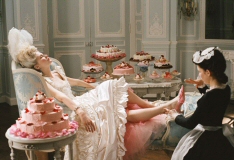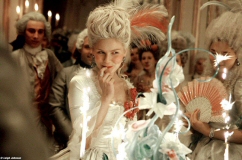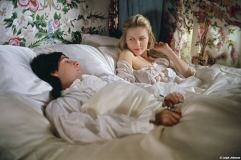Marie Antoinette (Sofia Coppola, 2006)
 Sofia Coppola's
Marie Antoinette modernizes the historical drama by grounding a genre
usually most concerned with bold gestures in specificity. The first hour is
dominated by awkwardness and dislocation, giving the impression that Coppola has
made an anti-dramatic mood piece. It seems obvious that the titular character
has been conceived less as an Austrian royal of the era than as a passive
audience surrogate. Kirsten Dunst, who plays the future queen, is so
self-conscious and overly styled that when someone quips that, "She looks
like a little piece of cake," they’re utterly right. The obligatory
events of Marie Antoinette’s life, such as her attempts to conceive, all
promise the viewer with dramatic developments, only to stymie those expectations
by seeming not to matter at all. The plot, as it is, is at least somewhat
historically accurate, but is told from a point of view that’s insulated by
any of the outside factors that defined Marie Antoinette in the public eye (she
dismisses the rumors that swirl around her as “ridiculous stories”).
Sofia Coppola's
Marie Antoinette modernizes the historical drama by grounding a genre
usually most concerned with bold gestures in specificity. The first hour is
dominated by awkwardness and dislocation, giving the impression that Coppola has
made an anti-dramatic mood piece. It seems obvious that the titular character
has been conceived less as an Austrian royal of the era than as a passive
audience surrogate. Kirsten Dunst, who plays the future queen, is so
self-conscious and overly styled that when someone quips that, "She looks
like a little piece of cake," they’re utterly right. The obligatory
events of Marie Antoinette’s life, such as her attempts to conceive, all
promise the viewer with dramatic developments, only to stymie those expectations
by seeming not to matter at all. The plot, as it is, is at least somewhat
historically accurate, but is told from a point of view that’s insulated by
any of the outside factors that defined Marie Antoinette in the public eye (she
dismisses the rumors that swirl around her as “ridiculous stories”).
 Coppola actively provokes her audience a few times during this half of
the film. When she opts to put an aggressively modern dressing montage set to
“I Want Candy” right after a scene of Marie Antoinette bursting into tears,
it’s difficult to tell if she’s trying to underscore her heroine’s
vapidity, striking an ironic pose, or going after something more complicated.
Put into the overall context of the film, though, the latter response seems most
appropriate. Coppola's selection of discreet moments from the Queen’s life
gradually adds up to the kind of character development one would expect from a
film that bears her name. As the movie subtly progresses, the Queen is
transformed by motherhood and begins to attain some degree of self-awareness and
purpose before she’s suddenly deposed.
Coppola actively provokes her audience a few times during this half of
the film. When she opts to put an aggressively modern dressing montage set to
“I Want Candy” right after a scene of Marie Antoinette bursting into tears,
it’s difficult to tell if she’s trying to underscore her heroine’s
vapidity, striking an ironic pose, or going after something more complicated.
Put into the overall context of the film, though, the latter response seems most
appropriate. Coppola's selection of discreet moments from the Queen’s life
gradually adds up to the kind of character development one would expect from a
film that bears her name. As the movie subtly progresses, the Queen is
transformed by motherhood and begins to attain some degree of self-awareness and
purpose before she’s suddenly deposed.
 Despite the fact that the film is one giant anachronism, the overall tone
here lacks the wink-wink of something like Baz Luhrmann’s Moulin Rouge.
Less post-modern for its own sake than because this is how Coppola herself must
have come to contextualize the queen’s experience, the film is assuredly
guilty of navel gazing (as all of the director's works to date are), even though
it spends so much time fetishizing Dunst. It’s a useful soft of
self-absorption, though, because it seems to capture the tragic youth that
proved to be the Queen’s undoing. Like Hou Hsiao-Hsien’s Millennium Mambo,
Marie Antoinette creates biography as much through its soundtrack,
attitudes and its close-ups as it does through its action and dialogue.
Despite the fact that the film is one giant anachronism, the overall tone
here lacks the wink-wink of something like Baz Luhrmann’s Moulin Rouge.
Less post-modern for its own sake than because this is how Coppola herself must
have come to contextualize the queen’s experience, the film is assuredly
guilty of navel gazing (as all of the director's works to date are), even though
it spends so much time fetishizing Dunst. It’s a useful soft of
self-absorption, though, because it seems to capture the tragic youth that
proved to be the Queen’s undoing. Like Hou Hsiao-Hsien’s Millennium Mambo,
Marie Antoinette creates biography as much through its soundtrack,
attitudes and its close-ups as it does through its action and dialogue.
80
Jeremy Heilman
8.15.2006